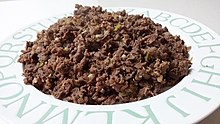Bulgogi
Bulgogi is a very popular dish in South Korea, where it can be found anywhere from upscale restaurants to local supermarkets as pan-ready kits.
[3] Bulgogi came from the Korean word bul-gogi (불고기), consisting of bul ("fire") and gogi ("meat").
[5] It was listed in the 1947 edition of the Dictionary of the Korean Language as meat grilled directly over a charcoal fire.
[9][10] It was called neobiani (너비아니), meaning "thinly spread" meat,[11] during the Joseon period and was traditionally prepared especially for the wealthy and the nobility.
[12] In the medieval Korean history book Dongguksesi (동국세시), bulgogi is recorded under the name yeomjeok (염적), which means "fire meat."
Before cooking, the meat is marinated to enhance its flavor and tenderness with a mixture of soy sauce, sugar, sesame oil, garlic, ground black pepper, and other ingredients such as scallions, ginger, onions or mushrooms, especially white button mushrooms or matsutake.
Bulgogi is eaten any time of the year; however, it is common for people in Korea to enjoy grilling the marinated meat on special occasions or in social settings.
The hamburger patty is marinated in bulgogi sauce and served with lettuce, tomato, onion, and sometimes cheese.



